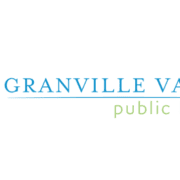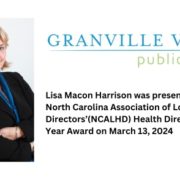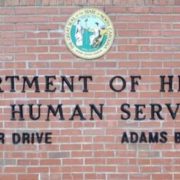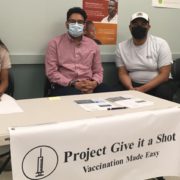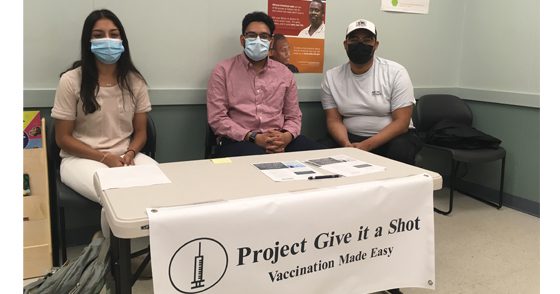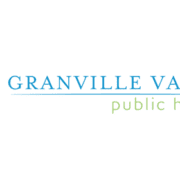Granville Vance Public Health Director Lisa Macon Harrison was named Health Director of the Year at the North Carolina Association of Local Health Directors’ annual awards ceremony in Raleigh.
Harrison, who has been at the helm of GVPH for 12 years, was selected based on her commitment to public health and “lifting the work, value and voice of health departments locally, statewide and at the national level,” according to a press release.
NCALHD President Quintana Stewart presented the award to Harrison. “Lisa is a leader not only for her health department but also for several local health departments in North Carolina and across the United States as she has shared their stories and passion while advocating for needed resources to support their dedication to improving the lives of our neighbors,” Stewart stated.
In a telephone interview Wednesday with WIZS News, Harrison said the award was “a huge surprise – I wasn’t expecting it.” She did say, however, that as she sat in the audience, listening to the presenter talk about the not-yet-named recipient, she thought the list of accomplishments sounded familiar.
“I thought, ‘That sounds a lot like my resume,’” Harrison said. “And then, all of a sudden, comes in the leadership team and Michael,” her husband. “It totally surprised me – I didn’t know a thing about it until the end,” she added.
“It’s been such a fun experience,” Harrison said. “Being in public health is working with some really caring, skilled, talented, smart people who are just nice to work with. It’s just such a pleasure to get up and go to work every day – I’m very lucky.”
Harrison called her leadership team “amazing,” and said the staff of 100 works hard every day. “There’s so much work to be done in a health department and our people just do it really, really well, so we’re held up as an example in rural public health,” Harrison said.
Growing up in Cullowhee in the western part of the state and working in a largely rural area has shaped her career – and her passion – for rural North Carolina. Harrison became a leader and champion for rural communities throughout the state and nation and focusing on the importance of public health in all communities.
During her 12 years at GVPH director, Harrison has created, led and supported a multitude of public health service enhancements and expansions. The health department’s budget has increased by 129 percent under her leadership, a testament to her advocacy efforts with local and state elected officials as well as her gift of successful grant writing.
Since 2015, GVPH has secured more than $6 million in grant funding to combat mental health and substance use disorder challenges in the two counties it serves. GVPH was the first health department in North Carolina to offer Medication Assisted Treatment, building on the success of the primary care services model to provide regular visits with a healthcare provider and linking individuals to behavioral healthcare and support resources. As a result, the National Association of Counties selected GVPH for a Peer Exchange site visit in April 2023, bringing leaders from across the U.S. to the rural communities in Vance and Granville counties.
Since 2016, GVPH has offered comprehensive primary care services to ensure whole-person care, including preventive services for obesity, diabetes, hypertension and medical nutrition therapy.
In addition, GVPH has also implemented, supported, or led partnerships aimed at reducing the number of people with mental illness in jails along with 30 agencies representing law enforcement, jail administration, public health agencies, EMS, social work agencies, behavioral health agencies, and community through the Stepping Up program. Harrison brought together organizations and community members to help kids stay healthy through the Working on Wellness Coalition, which implements and evaluates the impact of evidence-based interventions focused on nutrition, physical activity and prevention of chronic disease to improve child health and well-being in Granville and Vance counties.
Harrison also makes sure that the health department provides “safety net” care for its clients. Since 2016, GVPH has offered comprehensive primary care services to ensure whole-person care, including preventive services for obesity, diabetes, hypertension and medical nutrition therapy.
But her influence extends beyond county lines as she has proven herself to be an unwavering champion for local public health in North Carolina and across the nation. Harrison has often represented local health departments in media campaigns, on commissions and to statewide leaders. She served as a Task Force Chair for the N.C. Institute of Medicine’s Future of Local Public Health Task Force and was inducted as a member of the N.C. Institute of Medicine.
In October 2021, as the COVID pandemic continued to affect so many people’s lives and livelihoods, Harrison, as president of the National Association of County and City Health Officials, presented testimony to the Subcommittee on Health of the House Committee on Energy and Commerce highlighting the national public health workforce crisis and explaining that no other healthcare providers have the breadth of responsibility for communicable disease control as public health workers.
As a result of being a part of this national discussion, U.S. Secretary of Health and Human Services Xavier Becerra spent a day visiting Granville and Vance counties in November 2023 and participated in a GVPH-led roundtable discussion highlighting efforts to expand healthcare access and lower healthcare costs in rural areas.
GVPH Medical Director Dr. Shauna Guthrie, called Harrison a champion and strong voice for local public health in the state and nationally.
“Whether in her community, across the 100 counties of North Carolina, or the almost 3,500 local health departments across the nation, Lisa is a public health warrior,” Guthrie said. “She is an innovative leader who has highlighted Granville and Vance counties for community efforts to improve their health, and who finds partnerships across various healthcare groups to further the practice of public health.”
By partnering with agencies and organizations throughout the counties it serves, GVPH can effect positive change. Whether it’s with schools, hospitals or the juvenile justice system, these partnership touch people’s lives. “That’s what success means to me in public health,” Harrison said.

